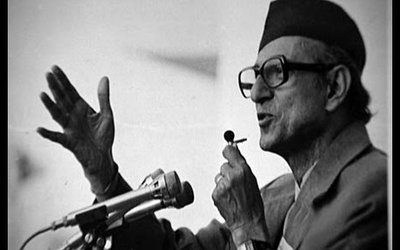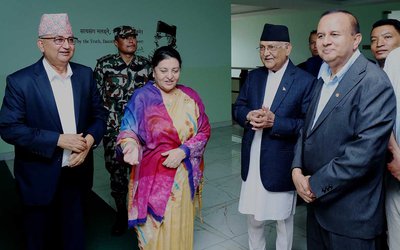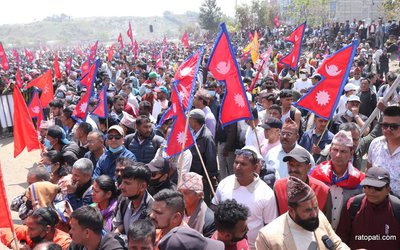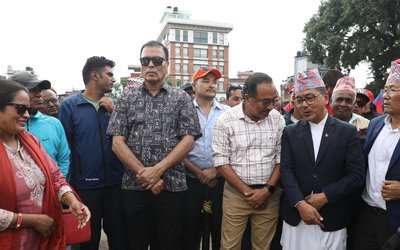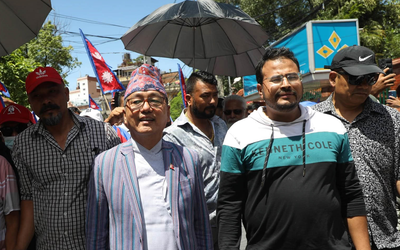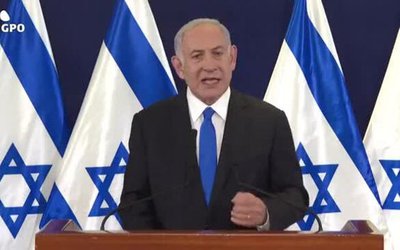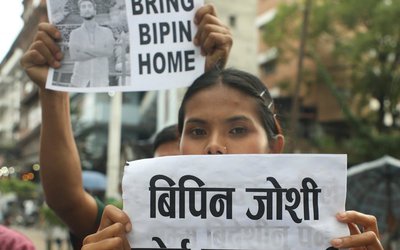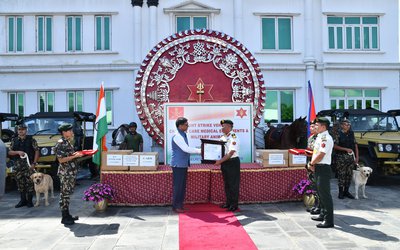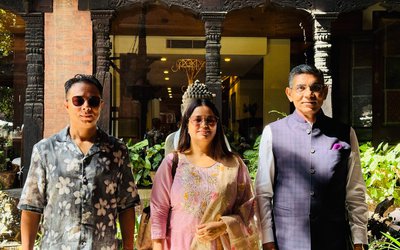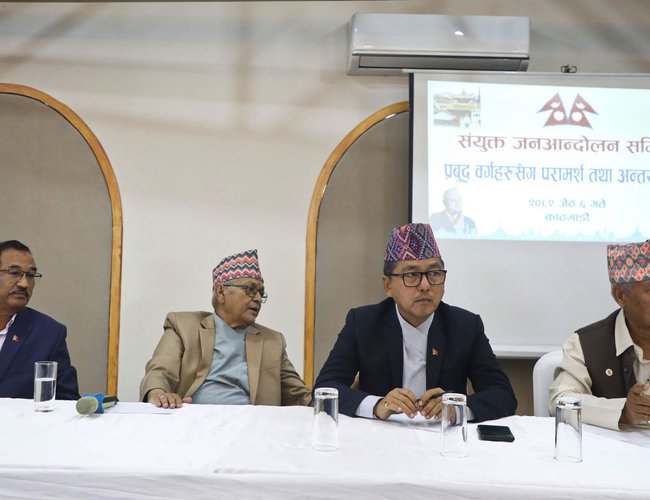
President of Rastriya Prajatantra Party (RPP) Rajendra Lingden emphasized that the restoration of the monarchy will be achieved through the support of the people.
Speaking at an event in Kathmandu on Tuesday, President Lingden highlighted that the changes in Nepal have historically not been driven by elections. He stated that the changes in 2007 and 2017 did not result from electoral processes.
President Lingden pointed out that the changes in Nepal in 2046, 2062, and 2063 were not brought about through elections either. Therefore, he stressed that the current efforts to bring about change should be people-driven. He emphasized the importance of unity among monarchists and the need to strategically strengthen relationships with other parties.
In a show of solidarity among pro-monarchists, a motorcycle rally was organized in Kathmandu last week to demonstrate their unity.
Under the leadership of movement leader Nawaraj Subedi, the rally began in Sukedhara in Kathmandu on Friday afternoon and proceeded to Balkhu as directed by the committee.
Before the rally, a press conference was held by the pro-monarchists, where they reiterated their determination to protest until the monarchy is restored. The committee has confirmed that the protest program has started as planned. Committee coordinator Nawaraj Subedi, RPP Nepal chairman Kamal Thapa, RPP leader Bikram Pandey, and others attended the rally. The committee has announced that the people's movement will start on May 29.
A new strategy has been developed to provide a 'fresh perspective' to the movement, including street demonstrations and meditation to bring back the king. The Joint People's Movement Committee, led by Subedi, introduced a new program for the movement on May 8.
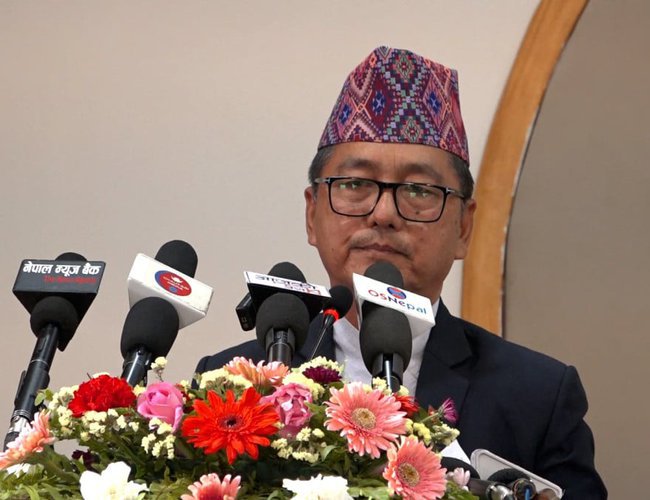
Subedi had previously mentioned that the Shah would remain on the throne until May 29, while the committee has announced an indefinite protest starting on that day.
However, some activists from outside the Kathmandu Valley who participated in the announcement meeting expressed concerns about launching the movement at the beginning of the rainy season.
The announcement of the movement at a 'party palace' in Sukedhara, Kathmandu, saw supporters of the monarchy restoration showing a heightened level of enthusiasm compared to previous events.
This marked the first time that all major political parties advocating for the reinstatement of the monarchy had joined forces in a unified movement. With this newfound unity and determination, the Subedi-led committee declared an indefinite movement starting on the 15th of Jestha.
The increased energy and optimism among monarchists can be attributed to the unprecedented collaboration among the political parties. Notably, Rajendra Lingden, the chairman of the Rastriya Prajatantra Party, had not previously been involved in Subedi's activities.
Alongside him, RPP Nepal Chairman Kamal Thapa and Rastriya Shakti Nepal Coordinator Keshar Bahadur Bista addressed the crowd, reaffirming their commitment to the movement's goals.
Bista described the announcement as the happiest day of his life, while Thapa seemed to be encouraging Lingden by suggesting that he would play a leading role. Thapa assured supporters of their unity, emphasizing their dedication to achieving good governance, economic prosperity, and the restoration of the monarchy and Hindu nation by freeing the country from corrupt governance promptly.
Lingden, the newly elected president of RPP, addressed Thapa as 'brother' and expressed support for unity. He urged members of various political parties to join forces for polarization.
RPPleader Rajaram Bartaula expressed enthusiasm for the reunion of leaders on a single platform, stating that it would empower their movement. The RPP's readiness for change, despite past reluctance, has raised questions.
Kamal Thapa, who initially criticized Lingden for his defeat by the former king, has now publicly acknowledged Lingden's significant role. Experts suggest that various factors may have influenced this change in stance.
Nawaraj Subedi, coordinator of the People's Movement Coordination Committee, is calling on political parties and individuals, including the Rashtriya Swatantra Party and Kathmandu Metropolitan City Mayor Balen Shah, to support the movement to restore the monarchy. Subedi has specifically reached out to the RSP and Balen Shah to participate in the upcoming protest starting from Jestha 15. He has also urged the acting president of the RPP, DP Aryal, to support the movement, with Aryal indicating that the party will discuss the matter internally.
The movement coordination committee has not received a response from Balen. The Subedi-led coordination committee, advocating for a monarchy and Hindu-based nation, seeks support from international organizations like the United Nations.
Subedi has informed UN representatives in Nepal, the EU, SAARC, and Amnesty International about the movement, emphasizing the need to listen to the Nepali people's voice and reject changes made through illegitimate means.
The People's Movement Coordination Committee plans an awareness campaign on Jestha 9, 10, and 11 to bolster the protest on Jestha 15. The Nepali Congress, part of the ruling coalition, is showing flexibility in its stance on the monarchy restoration movement.
It is understood that Congress President and former Prime Minister Sher Bahadur Deuba has conveyed a message to the monarchy restoration movement indicating his openness to the idea of a constitutional monarchy and his potential support for Hridayendra Bir Bikram Shah as king.
Lokesh Dhakal, a leader who advocates for the constitutional monarchy envisioned by the Nepali Congress's founding leader BP Koirala, and believes that cooperation between the Nepali Congress and democratic forces is crucial for maintaining the country's independence and democracy, has welcomed Deuba's stance. T
he announcement of a 'decisive' movement to restore the monarchy starting on May 29 has heightened tensions between the Nepali Congress and the CPN-UML, with support for the movement evident in nearly 70 out of the 77 districts of the country. Additionally, former King Gyanendra Shah's appeal to the people has further fueled the momentum of the movement.
In the meantime, the Nepali Congress leadership has displayed a willingness to reconsider its stance on the monarchy. Dhakal mentioned that Deuba conveyed this suggestion through a representative, although the envoy's identity was not disclosed.
Shortly after Deuba's proposal, another prominentNepali Congress leader, Shekhar Koirala, recommended conducting a referendum on secularism and republicanism.
At eighty-six years old, Subedi, with his strong determination to reinstate the constitutional monarchy and multi-party democracy, has been leading nationwide protests since May 29. Given Nepal's political history, nothing is deemed impossible in Nepali politics.
- EU’S ERASMUS MUNDUS: Scholarship For Quality Education
- Aug 05, 2025
- ADB: Partnership For Growth
- Aug 04, 2025
- HCC-N: Economic Ambassador
- Aug 03, 2025
- MONETARY POLICY: Disappointing Outcome
- Jul 17, 2025
- MELAMCHI WATER SUPPLY: No Interruption During Monsoon
- Jun 25, 2025
